- HOME
- Sustainability
- Establishing Sustainable Supply Chain
- Socially Responsible Procurement Initiatives at Toray Group
CSR Activity Report (CSR Guideline Activity Reports) - Establishing Sustainable Supply Chain
Socially Responsible Procurement Initiatives at Toray Group
Toray Group Supply Chain
Toray Group’s supply chain extends to diverse countries and regions around the world. In fiscal 2023, the Group’s purchasing by region was 44% in Japan, 38% in the rest of Asia, 10% in Europe, and 8% in the Americas. Purchasing by business segment was 32% for Fibers & Textiles, 23% for Plastics & Chemicals, 15% for Films, 12% for Carbon Fibers Composite Materials, and 18% for others. Operating in a wide range of industries, the Group’s suppliers include general trading companies, specialized trading companies, and worldwide producers of petrochemicals, fuels, pharmaceuticals, molded products, packaging materials, machine tools, precision equipment, machine parts, and processed materials. The Group conducts both regular and spot transactions.
Fiscal 2023 Purchasing Breakdowns by Region and Business Segment (Based on Transaction Value)
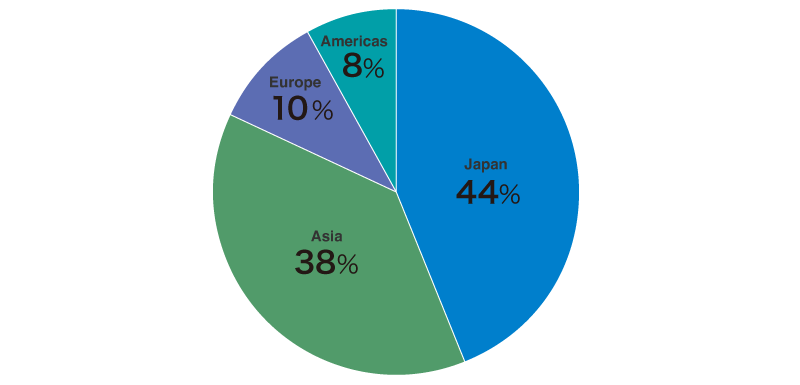
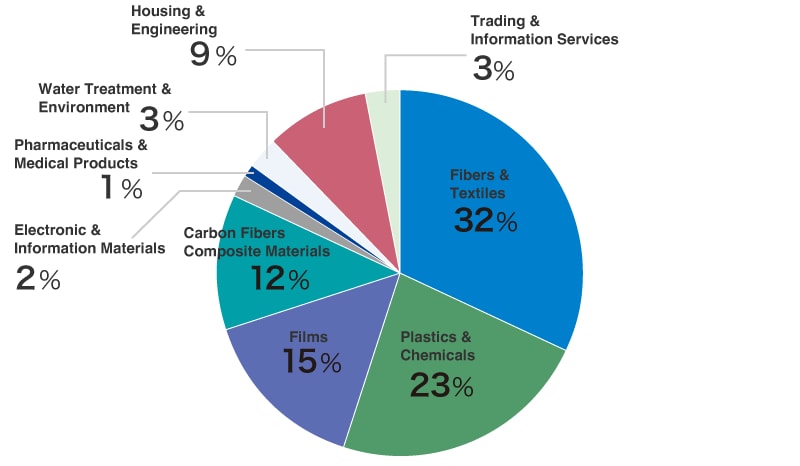
Toray Group's Socially Responsible Procurement Activities
Suppliers agreeing to the Toray Group CSR Procurement Guidelines (%)
- ■Reporting scope
- Toray Group
- ■Target in fiscal 2023
- At least 75%
Result in fiscal 2023
76.8%
Implementation of supply chain due diligence (% of cases)
- ■Reporting scope
- Toray Group
- ■Target
- At least 60% (Fiscal 2024)
Result in fiscal 2023
1
- 1 Since efforts to achieve the fiscal 2024 target began recently, there are no figures to report for fiscal 2023. During this year, measures were taken to determine the anticipated high-risk issues, countries, regions, and industries, and preparations were made to identify and investigate the relevant suppliers.
With its global supply chain, Toray Group places top priority on ascertaining suppliers' CSR activities and requesting them to implement the necessary initiatives. Toray Group is facilitating CSR initiatives across its supply chains, including at group companies in Japan and around the world. These efforts include developing a socially responsible procurement system, responding to customers’ requests for CSR practices, ascertaining supplier CSR initiatives, educating suppliers, carrying out CSR surveys of suppliers, requesting compliance with the Toray Group CSR Procurement Guidelines, and conducting activities to obtain written agreements on these guidelines. Toray Group uses its own questionnaire survey system to conduct regular surveys of suppliers and monitor their CSR efforts. The Group assesses suppliers based on uniform group standards, provides feedback on the results to suppliers, and follows up on poor-performing suppliers. By maintaining this due diligence process, the Group endeavors to raise suppliers’ awareness and efficiently and effectively ascertain, prevent, and lower CSR risks across the supply chain. Moreover, Toray Group has created its own Supply Chain CSR Promotion Guidebook, which is regularly distributed to suppliers as a reference material, along with feedback concerning the periodic CSR procurement surveys.
Initiatives to Mitigate Global CSR Procurement Risk
To mitigate CSR procurement risks within Toray Group, a process was developed to identify key CSR procurement risk factors such as country, region, and industry. The process identifies suppliers for investigation, followed by risk assessments, audits, and mitigation measures.
After identifying and prioritizing CSR procurement risks, the Group decided to focus on three key issues for detailed investigation: human rights and labor, safety and hygiene, and environmental protection. Questionnaires and audit procedures were created to investigate these issues with suppliers.
To evaluate the operational feasibility of the prepared questionnaires and audit procedures, tests were conducted together with group companies worldwide, in preparation for the actual implementation of the investigation process. To pick out suppliers requiring investigation, an identification process was created that narrows down suppliers based on information collected from group companies worldwide, taking into account factors such as the supplier country, region, and industry.
In fiscal 2024, the Group will establish the risk identification and investigation processes, conduct risk assessments of identified suppliers, and perform audits and follow-up actions in cases where risks are found. Through these efforts, CSR procurement risks will continue to be mitigated across the entire Toray Group.
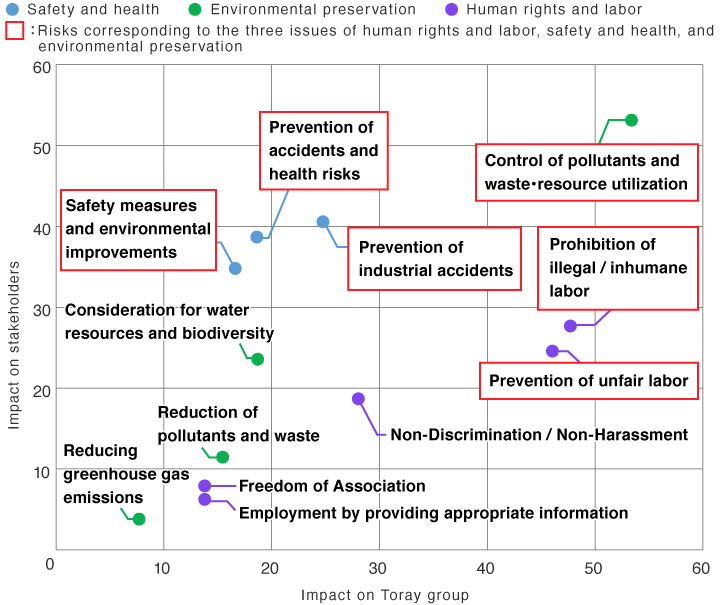
As a KPI under its CSR Roadmap 2025, Toray Group has adopted the implementation rate for supply chain due diligence and is promoting efforts accordingly.
Each of the 80 group companies outside Japan is working to identify and survey suppliers deemed high-risk in terms of human rights and labor, safety and hygiene, and environmental protection. This applies to the 2,341 major suppliers that have received the Toray Group CSR Procurement Guidelines. The higher risk suppliers are identified based on factors such as the country, region, and industry. The goal is to achieve a due diligence implementation rate of 60% or higher by fiscal 2024 and 90% or higher by fiscal 2025.
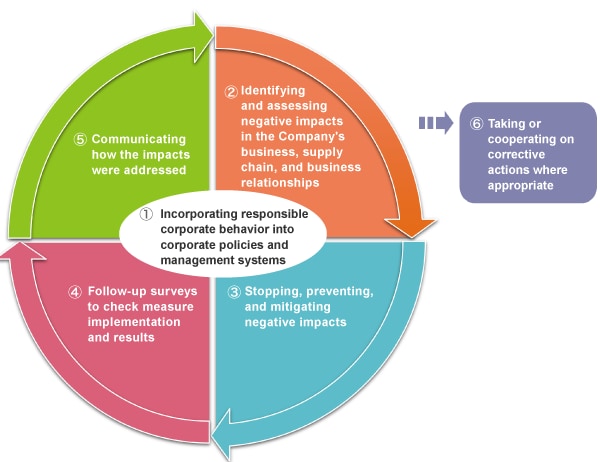
- ① Incorporating responsible corporate behavior into corporate policies and management systems
- Toray Group Policy for Human Rights
- Ten Basic Environmental Rules
- Recycling Activity Principles
- Toray Group Biodiversity Basic Policy
- Toray Group's Basic Policy for Increasing Green Areas
- Toray Group CSR Procurement Policies
- Presenting the Toray Group CSR Procurement Guidelines to business partners and obtaining written agreements for compliance
- ② Identifying and assessing negative impacts in the Company's business, supply chain, and business relationships
- Conducting and evaluating the CSR Procurement Survey
- Establishing a whistleblowing hotline system
- Investigating high-risk issues related to CSR procurement
- Confirming business partner risks using a corporate search system
- Auditing business partners
- ③ Stopping, preventing, and mitigating negative impacts
- Providing individual feedback to each business partner using the evaluation results of the CSR Procurement Survey
- Visiting low-score companies and requesting improvements
- ④ Follow-up surveys to check measure implementation and results
- Verifying improvement situations using the next CSR Procurement Survey and other means
- ⑤ Communicating how the impacts were addressed
- Public announcement in the Group’s CSR Report and in the UK Modern Slavery Act statement
- ⑥ Taking or cooperating on corrective actions where appropriate
- Establishing a compliance violation reporting mechanism (setting up a whistleblowing hotline)
Main Items of CSR Surveys of Suppliers
Ⅰ. CSR promotion system
- □ Establishment of and familiarity with policies and guidelines
- □ Establishment of internal system and selection of responsible parties
- □ Establishment of goals and plans, review of activity results
Ⅱ. Corporate ethics and compliance
- □ Anti-corruption and bribery prevention
- □ Prevention of misuse of advantageous position and bid-rigging
- □ Thorough legal and ethical compliance
- □ Prevention of conflicts of interest
- □ Protection of confidential information and personal information
- □ Respect for and protection of intellectual property rights
- □ Avoidance of all involvement with organized criminal groups
- □ Prevention of use of technology barred under regulations and illegal exports
- □ Identification of use of conflict minerals and cobalt and country of origin
Ⅲ. Occupational safety and health
- □ Safety measures in workplace and improvements to working environment
- □ Prevention of occupational accidents
- □ Prevention of accidents and health risks
- □ Adoption of management system related to occupational safety
Ⅳ. Disaster prevention and risk management
- □ Development of education, training and manuals for disasters
- □ Establishment of business continuity plan (BCP) for large-scale disasters
- □ Establishment of BCP for pandemic
- □ Defense against threats on computer network
Ⅴ. Environmental conservation
- □ Obtaining and maintaining authorizations and registrations
- □ Prevention of pollutants and waste, promotion of resource use (3Rs: reduce, reuse, recycle)
- □ Appropriate management of chemical substances and pollutants in line with laws and regulations
- □ Greenhouse gas emissions management and reduction
- □ Green procurement, green purchasing, energy conservation activities
- □ Consideration for water resources and biodiversity and implementation of assessments
- □ Introduction of environmental conservation management system
Ⅵ. Interaction with stakeholders
- □ Disclosure of financial information and non-financial information
- □ Setting up hotlines for consultation and reporting, protection of whistleblowers
- □ Support for community activities and activities contributing to society, and encouragement of participation in such activities
Ⅶ. Product safety and quality assurance activities
- □ Assessment of product safety, management of substances contained in products
- □ Provision of information on specifications, quality and handling
Ⅷ. Human rights and labor
- □ Prevention of child labor and measures for young workers
- □ Prevention of forced labor, slave labor, and other forms of illegal or inhumane labor practices
- □ Provision of appropriate information to foreign workers and employment
- □ Prevention of undue low wages and wage reductions, as well as labor that exceeds statutory limits
- □ Ban on harassment, physical punishment, abuse, etc.
- □ Protection for freedom of association and collective bargaining, etc.
- □ Responding to the impact of COVID-19
Ⅸ. CSR initiatives in supplier's own supply chain
- □ Requests for promotion of CSR along supply chain
Socially Responsible Procurement Initiatives at Toray Industries
Every two years, in principle, Toray Industries carries out a CSR survey of major suppliers, business partners and distribution companies which together are responsible for 90% of the Company’s total procurement value. Questions are established based on the Toray Group CSR Procurement Policies and the Toray Group CSR Procurement Guidelines. The surveys exhaustively confirm the extent to which suppliers are addressing CSR, requesting actions on a variety of social issues such as respect for human rights, reduction of greenhouse gas emissions, consideration for water resources and biodiversity, and implementation of environmental assessments.
In fiscal 2022, Toray Industries carried out CSR surveys of major suppliers and received 448 responses (137 raw material suppliers, 157 equipment and material suppliers, 40 logistics companies, as well as 114 production and processing contractors). The results indicated that about 99% of companies surveyed were rated S, A or B2 for CSR practices, thus meeting the Company’s standards for business partners. The companies surveyed rated C or D, requiring further investigation of their CSR practices, accounted for just 1%. Analysis revealed that the average scores for the 448 companies improved compared to the previous survey with respect to most survey items such as environmental conservation, product safety and quality assurance activities, and human rights and labor. The results have reaffirmed that each company is promoting CSR initiatives. In addition, 80% of the companies that were rated C or D in the previous survey, visited to confirm actual conditions, and requested to make improvements earned to a B or higher rating in the current survey. The assessment results from the current survey have been shared with each company along with the contents of the analysis for fiscal 2023. The feedback was provided to each company in the form of a score sheet, which included not only their individual assessment, but also the overall averages, including the scores of other companies. In fiscal 2023, the Company individually visited all six suppliers that were rated C or D to confirm actual conditions and discussed measures for improvement. As a result, many improvements were made by these suppliers, such as establishing internal regulations on ethics and compliance and reflecting them in employee work rules, developing an internal business continuity plan (BCP) for disaster prevention and risk management, conducting internal training on human rights and labor, and using the Toray Group Supply Chain CSR Promotion Guidebook to request compliance measures from their own suppliers. Furthermore, in the case of business partners that met the standards required by Toray Industries based on the CSR Procurement Survey results, on-site audits are also progressively being carried out for those in industries where the risks of negative impacts are a concern.
In parallel with efforts to understand, assess, and improve the current status through CSR Procurement Surveys, Toray Industries is mitigating CSR-related risks by asking its suppliers to understand and comply with the Toray Group CSR Procurement Guidelines, established in March 2022, as part of efforts to further enhance CSR activities throughout the entire supply chain. These guidelines outline specific and detailed requirements for areas such as ethics, compliance, safety, accident prevention, risk management, environmental preservation, product quality and safety, and human rights promotion. In fiscal 2022, the Company sent the Toray Group CSR Procurement Guidelines to the 476 major suppliers surveyed and requested their understanding and compliance. In fiscal 2023, the Company did the same for 26 suppliers (reaching a total of 502 suppliers by the end of March 2024). In addition to asking for suppliers’ understanding and compliance, efforts have also been made to obtain written agreement from suppliers stating that they will adhere to the guidelines. As a result, 379 companies had provided such agreements by the end of fiscal 2023.
In addition, rules for responses to CSR surveys from customers are set and a system is in place to facilitate prompt and accurate responses.
- 2 Survey responses are assessed on a 10-point scale for each of the nine survey items. Taking the average score for the nine items as the overall score, 8 or more points is rated as S, 6 or more points but less than 8 is rated as A, 5 or more points but less than 6 is rated as B, 3 or more points but less than 5 is rated as C, and less than 3 points is rated as D.
- Percentage of suppliers with the level of efforts required by the Company (Rated as S, A, or B)
- 99%
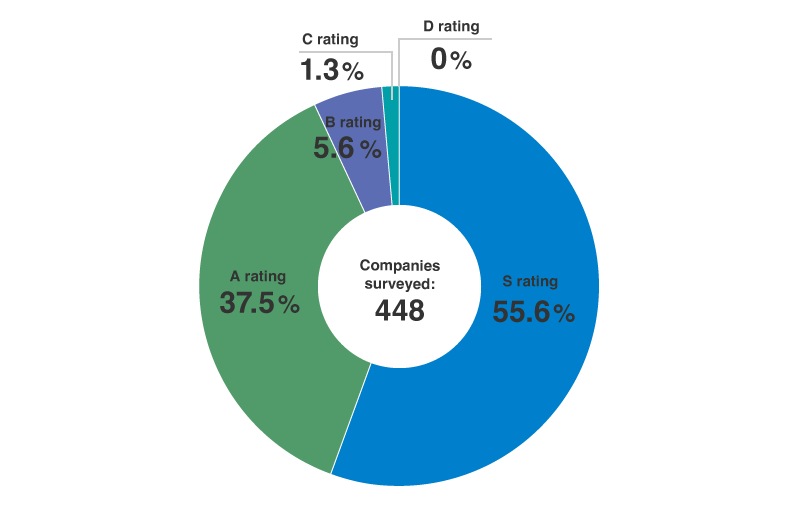
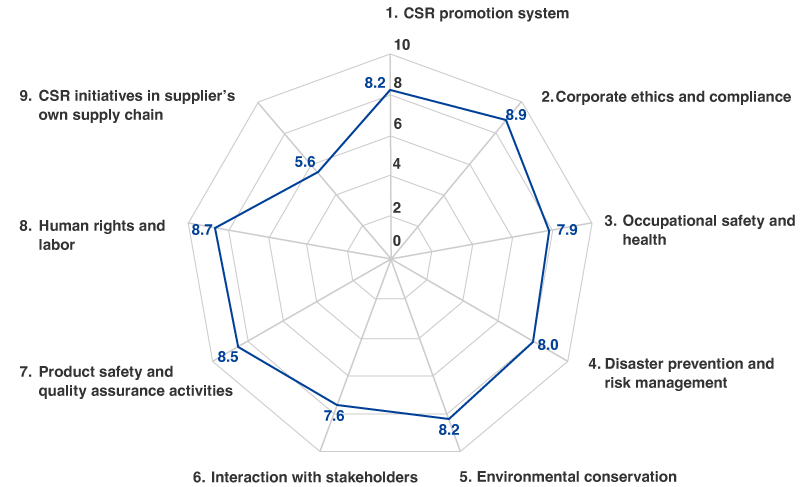
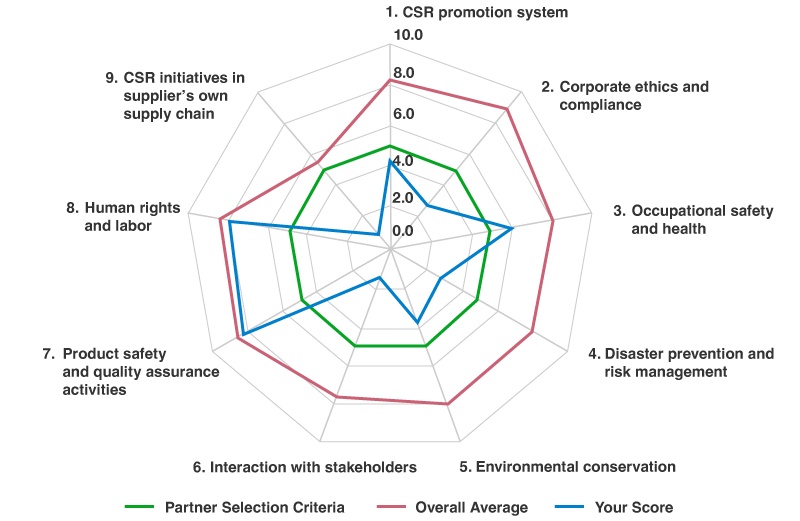
Socially Responsible Procurement Initiatives at Toray Group Companies in and outside Japan
Toray Group Companies in and outside Japan have also established their own internal systems and rules and are conducting CSR procurement surveys of their suppliers. They also ask suppliers to comply with the Toray Group CSR Procurement Guidelines, while conducting audits and other measures to continually ascertain the status of supplier CSR initiatives and to request improvements.
Group companies outside Japan ask their suppliers to implement CSR initiatives. For suppliers that have not received such requests, Toray Industries conducts CSR procurement surveys and other measures to support CSR procurement at overseas group companies. In fiscal 2022, 80 group companies outside Japan sent the Toray Group CSR Procurement Guidelines to 2,212 of their major suppliers. In fiscal 2023, 129 more business partners were contacted, reaching a total of 2,341 major suppliers as of March 31, 2024. In addition to requesting cooperation and compliance, the group companies are working to obtain written agreement from them stating they will adhere to the guidelines. As a result, by the end of fiscal 2023, they had obtained such agreements from 1,542 suppliers, excluding 121 companies that group companies do not expect to do business with in the future. With the support of Toray Industries, group companies outside Japan will continue to obtain written agreements from existing and new suppliers.
Group companies in Japan also continued to request CSR procurement measures from their suppliers. In fiscal 2023, these companies conducted a CSR procurement survey among their major suppliers and received 851 responses. In addition to checking the CSR promotion situation at each supplier using the questionnaire, the relevant evaluation results were shared with each supplier as feedback. The suppliers requiring further investigation of their CSR practices were subject to such investigation, and group companies in Japan requested that suppliers requiring further investigation of their CSR practices make improvements. In fiscal 2022, 41 group companies in Japan sent the Toray Group CSR Procurement Guidelines to 1,539 major suppliers and requested their cooperation and compliance. In fiscal 2023, 14 more business partners were contacted, reaching a total of 1,553 major suppliers as of March 31, 2024. Group companies in Japan have been carrying out activities to obtain written agreements from suppliers on adherence to the guidelines. As a result, by the end of fiscal 2023, these group companies obtained written agreements from 1,319 suppliers, excluding 57 suppliers that these group companies do not expect to do business with in the future. With the support of Toray Industries, the group companies in Japan will continue to obtain written agreements from existing and new suppliers.
Furthermore, the CSR Roadmap 2025 sets KPI for the percentage of group-wide suppliers that have agreed to follow the Toray Group CSR Procurement Guidelines. The targets for fiscal 2023, 2024, and 2025 are 75%, 85% and 90% or higher, respectively. In fiscal 2023, agreement was obtained from 3,240 out of 4,218 major Toray Group suppliers, representing 76.8% of business partners.
Examples of Workplace Initiatives in Fiscal 2023
Initiatives by the U.S. Toray Group Procurement Team
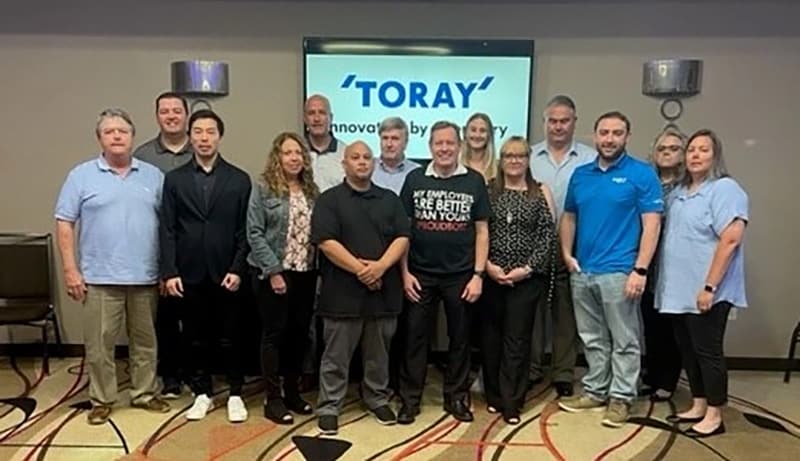 Members of the U.S. Toray Group procurement team who attended the meeting
Members of the U.S. Toray Group procurement team who attended the meeting
The Toray Group procurement team in the United States, consisting of procurement representatives from eight Toray Group companies in the country, participated in the annual conference held by the Institute for Supply Management in Dallas, Texas. The team also engaged in discussions regarding initiatives relating to Toray Group projects in 2023 and 2024.
Human Rights in the Supply Chain
Toray Group believes that respect for human rights and environmental preservation are especially crucial elements in ensuring that the supply chain is stable and sustainable.
The Toray Group CSR Procurement Policies state that Toray will work to build a supply chain that promotes human rights and preserves the environment. The Group requests that suppliers comply with the Toray Group CSR Procurement Guidelines and take measures to respect human rights; prohibit forced labor, slave labor, child labor, and unfair low-wage labor; and to protect the environment, including by reducing GHG emissions and conserving biodiversity.
With the CSR procurement questionnaire, the Company strives to understand and evaluate suppliers' initiatives related to human rights, labor practices, and environmental preservation. It also ascertains and prevents issues from arising in the supply chain.
Results of Fiscal 2022 CSR Survey of Suppliers Regarding Respect for Human Rights
The survey conducted by Toray Industries in fiscal 2022 confirmed a high rate of implementation of initiatives on 12 survey items, excluding those related to requests to secondary suppliers, out of 13 items related to human rights and labor. In fiscal 2023, the Company conducted individual status checks and requested responses from those suppliers who answered “Will address in one year” ([1] in the table below) and “Not addressed” ([0] in the table below). The Company will confirm the results of supplier improvement measures using the fiscal 2024 CSR Procurement Survey.
In addition, CSR procurement surveys have been used since fiscal 2020 to investigate whether suppliers had been responding appropriately to various issues related to human rights, such as employment and labor issues that could have arisen due to the pandemic, and to identify and prevent issues within the supply chain.
| Survey Questions | Implementation rate | Survey results (The results are ranked from 0 to 4. 0 and 1 mean that the company has not addressed the issues.) |
|---|---|---|
| 1. Have policies and guidelines been set and employees educated about respect for human rights, eliminating discrimination and improving the work environment? | 99.2% |  |
| 2. Has an internal system been set up and people responsible for its promotion been designated in regards to respect for human rights, eliminating discrimination and improving the work environment? | 98.6% |  |
| 3. Have goals and plans been set, activity results reviewed and mechanisms for making improvements and corrections devised in regards to respect for human rights, eliminating discrimination and improving the work environment? | 98.4% |  |
| 4. Do you employ anyone under the working age stipulated by applicable laws and regulations? In the case of employees under the age of 18, are the working hours and health and safety of those employees given special consideration in accordance with relevant laws and regulations? | 99.5% |  |
| 5. Do you use any form of labor that is, or is similar to, forced and bonded labor, involuntary or exploitative prison labor, or modern slavery, or that is linked to human trafficking? Do you guarantee that all your employees are free to leave their employment at any time they wish? | 99.3% |  |
| 6. Do you provide each foreign worker with an employment contract, employment rules, and other relevant documents in a language the individual can understand? Also, do you ever confiscate, conceal, or destroy any identification documents, passports, work permits, or other similar documents belonging to such workers, or prevent them from using those documents? | 96.2% |  |
| 7. Do you pay appropriate wages in accordance with relevant laws and regulations when it comes to minimum wages, overtime, wage deductions, piecework wages, and other benefits? Are unfair pay cuts ever used? | 99.5% |  |
| 8. Are conditions appropriately managed and operated to ensure that sexual harassment, power harassment, physical punishment, emotion or physical abuse, pressure and other inhuman treatment and actions do not occur? | 99.3% |  |
| 9. Are conditions appropriately managed and operated to ensure that in recruiting, hiring and employing people, race, the color of one’s skin, age, gender, sexual orientation, nationality, religion and other factors do not result in discriminatory action? | 98.8% |  |
| 10. In all employment activities, including recruitment, hiring, compensation, and retirement, do you have policies and rules in place to prohibit any discrimination based on race, creed, skin color, sex, religion, nationality, language, physical characteristics, wealth, or place of birth, etc.? | 95.6% |  |
| 11. Do you recognize the rights of employees to freedom of association, in accordance with the laws and regulations of each country and region? Are arrangements made for employee representatives and employees to engage in dialogue and consultation with management without fear of retaliation, intimidation, or harassment? | 97.0% |  |
| 12. Is due consideration given to various employment, human rights, and labor issues that may arise due to the spread of COVID-19 and appropriate responses taken? | 98.8% |  |
| 13. Do you ask your suppliers to make improvements in regard to respect for human rights, the eradication of discrimination and improvement of the labor environment? | 69.8% |  |
- Supplemental information:
[4] Addressed well
[3] Addressed
[2] Addressed at minimum level
[1] Will address in one year
[0] Not addressed
For questions 4 to 12, only [3], [1], and [0] are used; no value has been set for [4] or [2].
Results of Fiscal 2022 CSR Survey of Suppliers Regarding Environmental Preservation
Toray Group considers the reduction of greenhouse gas emissions and biodiversity conservation to be important issues for preserving the global environment. Using CSR procurement surveys, the Group also checks the situation for supplier compliance with environmental laws, as well as supplier efforts to reduce GHG emissions and preserve biodiversity. The survey conducted by Toray Industries in fiscal 2022 confirmed a high rate of implementation of initiatives on 11 survey items, excluding those related to requests to secondary suppliers, out of 12 items related to environmental preservation. For example, the Company confirmed that 84% of its major suppliers are taking steps to reduce GHG emissions. Each supplier is provided with feedback on their questionnaire results, and those with insufficient CSR measures are asked to improve their compliance efforts. In fiscal 2023, the Company conducted individual status checks of those suppliers who answered “Will address in one year” ([1] in the table below) and “Not addressed” ([0] in the table below) in the fiscal 2022 questionnaire on questions concerning compliance with environmental laws, GHG emissions reduction, and biodiversity conservation initiatives. Improvements were requested as necessary, and the Company will confirm the results of supplier improvement measures using the fiscal 2024 CSR Procurement Survey.
| Survey Questions | Implementation rate | Survey results (The results are ranked from 0 to 4. 0 and 1 mean that the company has not addressed the issues.) |
|---|---|---|
| 1. Have you stipulated the policies or guidelines for promote environmental preservation and familiarized them with your employees? | 97.9% |  |
| 2. Have you prepared the internal system and designated the responsible person to promote environmental preservation? | 97.2% |  |
| 3. Do you have any mechanism to identify risks, institute the goals / plans, verify and improve / correct results of the activities in relation to environmental preservation? | 97.7% |  |
| 4. Have you acquired and maintained, and kept up to date all permissions and registrations to be required by the laws and public administration, etc. for the environment? | 94.4% |  |
| 5. Do you control discharge of pollutant and generation of waste and perform the efforts of saving resource and energy including reduction / reuse / recycle (3R) , etc.? | 95.7% |  |
| 6. Do you comply with the applicable laws / regulations,(REACH, ROHS, etc.) for, and appropriately manage the procured chemical substances? | 97.1% |  |
| 7. Do you appropriately manage discharge of chemical substances into environment including air pollutant and water pollutant and perform the efforts for reduction? | 94.0% |  |
| 8. Do you appropriately manage emission of greenhouse gas and perform the efforts for reduction (prevention of global warming)? | 84.1% |  |
| 9. Do you perform the activities concerning reduction of environmental load and energy saving including green procurement of raw materials and packing materials, green purchasing of office supplies office machinery, power saving of offices, use of EV cars? | 95.8% |  |
| 10. Do you understand your business activities which may cause an impact on water resources and biodiversity, consider sustainable use of resources and perform the activities to minimize the impact for preservation of biodiversity? | 91.0% |  |
| 11. Do you perform the environmental assessment regarding the products (assessment of the products’ impact on the environment)? | 84.8% |  |
| 12. Do you request the suppliers for promotion of environmental preservation? | 76.4% |  |
- Supplemental information:
[4] Addressed well
[3] Addressed
[2] Addressed at minimum level
[1] Will address in one year
[0] Not addressed
For questions 4 to 8, only [3], [1], and [0] are used; no value has been set for [4] or [2].
For questions 9 to 11, only [4] [3], [1], and [0] are used; no value has been set for [2].
As part of efforts to promote human rights protections and environmental conservation in the supply chain, the Company enables individuals to report relevant issues at any time via the Toray website. Out of a total of 319 inquiries and consultations received in fiscal 2023 via the CSR inquiry form on the Toray website, none were related to human rights in the supply chain.
Related Information
Addressing Conflict Minerals
The Toray Group CSR Procurement Policies prohibit the use of minerals that come from conflict zones or high-risk areas, as well as those that are clearly tied to armed conflict or human rights violations.
To comply with the rules, Toray Industries investigates whether conflict minerals are used in any of the raw materials and production equipment used for its products. If conflict minerals are used, the Company investigates the suppliers to determine the locations of smelters and mines.
In fiscal 2023, the Company also investigated products made with four raw materials: tin, tantalum, tungsten, and gold. It confirmed that none of the raw materials used were from conflict areas. Toray Industries has also set up an internal system for surveys and responses so that it can respond promptly and appropriately to requests from customers in regard to surveys on conflict minerals.
Sustainable Palm Oil Procurement
Oil procurement needs met by palm oil sourced in a manner that is environmentally responsible and respectful of human rights (% of oil purchased, by value)
- ■Reporting scope
- Toray Industries, Inc.
- ■Target
- At least 70% (Fiscal 2024)
Result in fiscal 2023
3
- 3 Since efforts to achieve the fiscal 2024 target began recently, there are no figures to report for fiscal 2023. The plan is to survey the Company’s major suppliers of lubricants containing palm oil by investigating those that account for 90% or more of the Company’s palm oil-related purchasing amount in fiscal 2023.
Toray Industries is investigating whether certain oil products it procures are made from palm oil grown and harvested based on principles of environmental conservation and respect for human rights. The Company has set a target for fiscal 2024 of at least 70% for the proportion of relevant products it procures made from sustainable palm oil. This serves as a KPI under the CSR Roadmap 2025, and the aim is to achieve at least 90% by fiscal 2025.
Moreover, the Toray Group CSR Procurement Guidelines require that these products also meet criteria such as measures to help preserve biodiversity and ensure that no forced or slave labor is used.
Toray Industries has also set up an internal system for surveys and responses so that it can respond promptly and appropriately to requests from customers in regard to surveys on palm oil use.
CSR Procurement Training
In November 2020 and February 2021, Toray Industries delivered two separate CSR e-learning modules to all executives and employees (including contractual workers, part-time staff, and temporary workers), which included content related to CSR procurement. A total of 13,947 individuals participated in the training. Special articles on CSR procurement have been featured in the Toray Group's internal newsletter to enhance group-wide awareness. In March 2024, Toray Industries invited an external consultant with expertise in CSR procurement to conduct a CSR webinar titled “The Importance of CSR Procurement and Due Diligence.” The online seminar was for Toray Group employees, including procurement personnel, to enhance their understanding of this topic.
Group companies worldwide are also conducting similar awareness-raising activities through the distribution of internal educational materials. These cover the necessity of CSR procurement, required activities, and examples of risk incidents.
Related Information
Human Rights Training for Contracted Security Companies
Toray Group outsources security services to companies specialized in that field, depending on the situation in the area where a business site is located.
In addition to training on the guard services required, the Group also provides training on human rights as necessary when contracting services.
Click here for the main initiatives for CSR Guideline 9, “Establishing Sustainable Supply Chain” in CSR Roadmap 2025.
